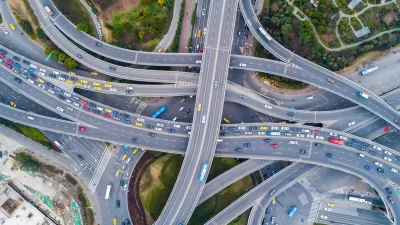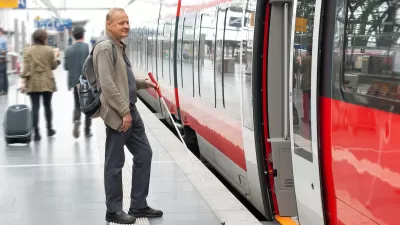Mobility leaders from around the country met to discuss multimodal transportation, equity, and accessibility.

As Cailin Crowe reports in Smart Cities Dive, “mobility leaders gathered in Chicago at the National Shared Mobility Summit last week to discuss how to sell U.S. residents on a less car-centric future, in addition to solutions for providing more accessible and racially equitable shared mobility options.”
Crowe highlights the main topics discussed. “In light of incoming federal investments for local infrastructure, many conference speakers emphasized the need to support shared mobility by first ensuring that basic infrastructure needs are being met.” For example, Disability Rights Education & Defense Fund Government Affairs Liaison Carol Tyson said that “Innovation is about having a bench at a bus stop and accessible pedestrian signals and curb ramps.”
“Panelists also emphasized the urgent need for racial equity within mobility, which includes addressing how cities enforce traffic laws.” Crowe writes that “Many safety and transportation groups, including the Governors Highway Safety Association, have also supported a ‘safe system’ approach that ‘acknowledges human error and seeks to minimize fatalities and serious injuries.’ Meanwhile, other transportation leaders have called on city officials to look at how street design and speed limit policies could help encourage safe driving instead of relying on police enforcement.”
Some panelists centered community input as key to building equitable and effective transportation systems. “Several panelists also emphasized the importance of compensating community members for their input and collaboration. Compensation allows community members to participate more fully in various projects, [Heidy Persaud, director of transportation equity at the nonprofit Center for Neighborhood Technology] said.”
FULL STORY: Mobility leaders dream of a less car-centric future

Alabama: Trump Terminates Settlements for Black Communities Harmed By Raw Sewage
Trump deemed the landmark civil rights agreement “illegal DEI and environmental justice policy.”

Planetizen Federal Action Tracker
A weekly monitor of how Trump’s orders and actions are impacting planners and planning in America.

The 120 Year Old Tiny Home Villages That Sheltered San Francisco’s Earthquake Refugees
More than a century ago, San Francisco mobilized to house thousands of residents displaced by the 1906 earthquake. Could their strategy offer a model for the present?

In Both Crashes and Crime, Public Transportation is Far Safer than Driving
Contrary to popular assumptions, public transportation has far lower crash and crime rates than automobile travel. For safer communities, improve and encourage transit travel.

Report: Zoning Reforms Should Complement Nashville’s Ambitious Transit Plan
Without reform, restrictive zoning codes will limit the impact of the city’s planned transit expansion and could exclude some of the residents who depend on transit the most.

Judge Orders Release of Frozen IRA, IIJA Funding
The decision is a victory for environmental groups who charged that freezing funds for critical infrastructure and disaster response programs caused “real and irreparable harm” to communities.
Urban Design for Planners 1: Software Tools
This six-course series explores essential urban design concepts using open source software and equips planners with the tools they need to participate fully in the urban design process.
Planning for Universal Design
Learn the tools for implementing Universal Design in planning regulations.
Clanton & Associates, Inc.
Jessamine County Fiscal Court
Institute for Housing and Urban Development Studies (IHS)
City of Grandview
Harvard GSD Executive Education
Toledo-Lucas County Plan Commissions
Salt Lake City
NYU Wagner Graduate School of Public Service





























